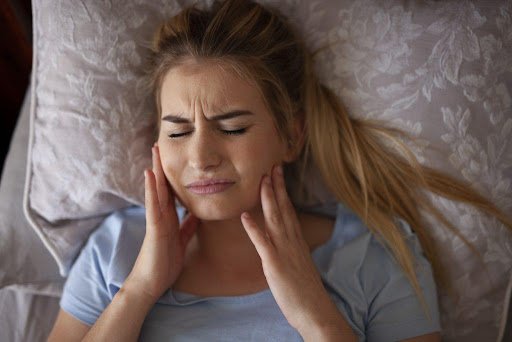Teeth are durable assets of human anatomy. Allowing us to perform some of the most fundamental actions of day-to-day life, such as; consuming food, speaking, and enhancing our appearance.
Table of Contents
ToggleAlthough designed to withstand and tear through tough obstacles, teeth can become damaged when neglected. This can occur in a variety of ways, such as; a lack of brushing and flossing giving space to bacteria and plaque buildup, or excessive grinding over time.
Professionally known as bruxism, this phenomenon is recognized as a dangerous habit where one continuously grinds, gnashes, or clenches their teeth. Listed below are some facts about bruxism:
Bruxism
Bruxism may present itself differently depending on the patient. However, regardless of how you may be grinding your teeth, it’s widely regarded as a habit you should immediately kick to the curb.
Many people unconsciously clench their jaws and grind their teeth throughout the day. This usually serves as your body’s reflex to holding tension, seeking to alleviate anxiety. Many perform these actions, and in turn damage their precious teeth over time, simply because they’re stressed. Beyond that, many may feel perfectly fine emotionally, yet still clench or grind their teeth as a sort of coping strategy to concentrate on certain tasks. It’s important to notice these patterns, and focus on other mediums to calm your state of mind and being.
Perhaps even more serious is the somewhat common condition of sleep bruxism. Identified precisely as it sounds, this is where the body subconsciously grinds the teeth while sleeping. It is considered a sleep-related movement disorder and is linked directly to having other like minded issues which negatively impact your sleeping patterns. Such as snoring and even sleep apnea, in which breathing repeatedly stops and starts while resting and can lead to dire consequences on the body if not addressed.
Signs and Symptoms
Regardless of how you grind your teeth, it’s important to get bruxism under control immediately. Please a dental professional if you’ve noticed habitual grinding habits and want a better understanding of steps forward to alleviate this issue.
With something so intimately tied into our subconscious functions, it may be challenging to identify if bruxism is something you struggle with. Consulting a dental professional will provide you with the most accurate diagnosis. However, there are still a variety of tangible signs and symptoms you may easily identify which may point to teeth grinding. Some of these include;
- Poor quality of sleep.
- Worn out enamel on the outer layer of the teeth.
- Observations from others witnessing your habit.
- Increased tooth pain or sensitivity.
- Tired or tight jaw muscles.
- A locked jaw that won’t open or close completely.
- Some teeth are chipped, loose, fractured, or flattened- especially compared to others.
- Earache is pain, however, it’s not stemming from the actual ear.
- Damage on the inside of the cheeks from internal chewing.
Remedies
Bruxism, and its following symptoms, can be professionally addressed by Hawkeye Group usually without too much cause for concern. However, if left unchecked, excessive teeth grinding can have drastic and long-lasting impacts on not only your oral health but your overall state of being as well.
It’s important to listen to the advice of dental professionals, which can provide you with a plethora of knowledge and advice on kicking the pesky habit to the curb, and building healthier practices instead.
If bruxism is still in its early stages and doesn’t have long-lasting implications, the focus lays primarily on future prevention and avoiding those habitual jaw movements. Such as massaging the jaw before sleep, avoiding chewing objects which aren’t food, and finding other positive outlets which unleash your body’s stress.
If bruxism has taken an extensive toll on your teeth, a dentist will suggest a treatment suitable for your specific situation. Some patients may damage their anatomy to such an extent that they may lose certain teeth completely, and require dental crowns or bridges to restore their smile.
Night Time Guards
One of the most common methods to stop sleep bruxism is night time mouth guards. If a dentist notices your teeth are being impacted by grinding, and comes to the conclusion that it subconsciously occurs during sleep, they can create a custom guard in just a few weeks. Designed to perfectly fit the natural grooves of your smile, this is fashioned during your sleep to halt the dangerous clenching and grinding your body performs. This is the best method to protect your smile overnight!
Other Factors
Even if your life is relatively void of stress, bruxism may still be tied to some other factors. Such as;
- Age: Most common amongst young children, it usually subsides with age.
- Genetics: You may have been passed down this habit from your relatives who have a history of bruxism.
- Personality: As cliché as it sounds, those who are more competitive and aggressive are at an increased risk to grind their teeth.
- Medications: Certain drugs and substances, such as antidepressants and even caffeine, alcohol, and tobacco increase your body’s likelihood of bruxism.
- Other disorders: Unfortunately, it may be a connection to other more serious mental health and medical disorders. Like Parkinson’s, dementia, epilepsy, sleep apnea, and ADHD.
If you think you may be at risk for bruxism, or have experienced any of the challenges discussed above, please give our office a call today!

